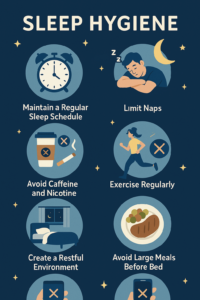Sleep Hygiene: A Scientific Guide To Better Sleep
 ✅ EVIDENCE-BASED RECOMMENDATIONS
✅ EVIDENCE-BASED RECOMMENDATIONS
- Maintain a consistent sleep-wake cycle: Go to bed and wake up at the same time daily, including weekends. This helps stabilise your circadian rhythm.
- Establish a calming pre-sleep routine: Activities like reading, gentle stretches, or mindfulness meditation reduce physiological arousal and promote melatonin secretion.
- Optimise your sleep environment: Ensure a dark (low light exposure improves melatonin), quiet, and cool bedroom. Reserve your bed for sleep and intimacy only (stimulus control).
- Morning sunlight exposure: At least 30 minutes of natural light, especially in the morning, supports the biological clock (suprachiasmatic nucleus).
- Engage in regular physical activity: Moderate aerobic exercise improves sleep onset and quality. Preferably earlier in the day.
🚫 SCIENCE-BACKED SLEEP DISRUPTORS TO AVOID
- Caffeine after mid-afternoon: Caffeine has a half-life of ~5 hours. Avoid coffee, tea, energy drinks, and chocolate after 3 PM.
- Heavy or late dinners: Large meals close to bedtime can trigger acid reflux and delay sleep onset.
- Late naps: Limit daytime naps to under 30 minutes and avoid after 4 PM to preserve homeostatic sleep pressure.
- Evening screen exposure: Blue light suppresses melatonin. Avoid screens 60 minutes before bed.
- Clock-watching: Repeated checking increases anxiety and hinders sleep initiation.
TROUBLE FALLING ASLEEP?
If you’re awake >20 minutes, leave the bed and engage in a quiet, low-light activity (like reading). Return to bed only when sleepy. This supports cognitive-behavioural principles of sleep association.
WHEN TO SEEK HELP
If sleep issues persist beyond 2–4 weeks or impact your mood, memory, or functioning—it’s time to consult a professional.
Contact Dr. Srinivas Rajkumar T for a personalised evaluation and scientifically backed treatment plan.
📞 Call: 8595155808
🌐 Online consultations available
📍 Apollo Clinics Velachery & Tambaram